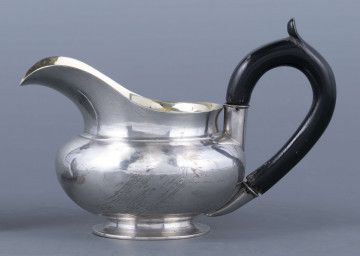
Creamer
1832 — 1850
National Museum in Lublin
Part of the collection: Goldsmithery
The milk jug, originally part of a multi-element set of table silver, shaped like a flattened sphere with a wide, wavy spout, a low, round, ring-shaped foot and a wooden ear made of a round shaft, bent into the shape of the letter C and painted brown, is one of the examples of the refined workshop of Karol Rotkiel, a goldsmith from Lublin active at the turn of the 18th and 19th centuries.
Karol Rotkiel was born in 1800 in Warsaw but acquired his skills in Italian goldsmiths' workshops. After returning to Poland in 1832, he settled in Lublin, where he opened a goldsmith's workshop in his tenement house at 21 Krakowskie Przedmieście Street. The same building also housed the famous English Hotel run by his wife, Ewa. Rotkiel's wares are classicist with baroque elements, as evidenced by his use of the popular technique of die-cutting, visible on the body of the vessel, halfway up of which is a band with a pattern of vertically elongated grains.
The die-cutting technique used by the goldsmith uses punches or punching stamps, called dies, which are used to press complex forms onto the surface of the metal in one go. During die-cutting, the goldsmith applies a low relief with a soft, continuous shape without sharp edges and angles, which could damage the metal when punched. Then he strikes the ornament on the vessel with a wooden hammer.
Author / creator
Dimensions
cały obiekt: height: 14 cm, width: 9 cm, diameter: 5 cm
Object type
goldsmith's art
Technique
gilding
Material
silver, nut wood
Creation time / dating
Creation / finding place
Owner
The National Museum in Lublin
Identification number
Location / status